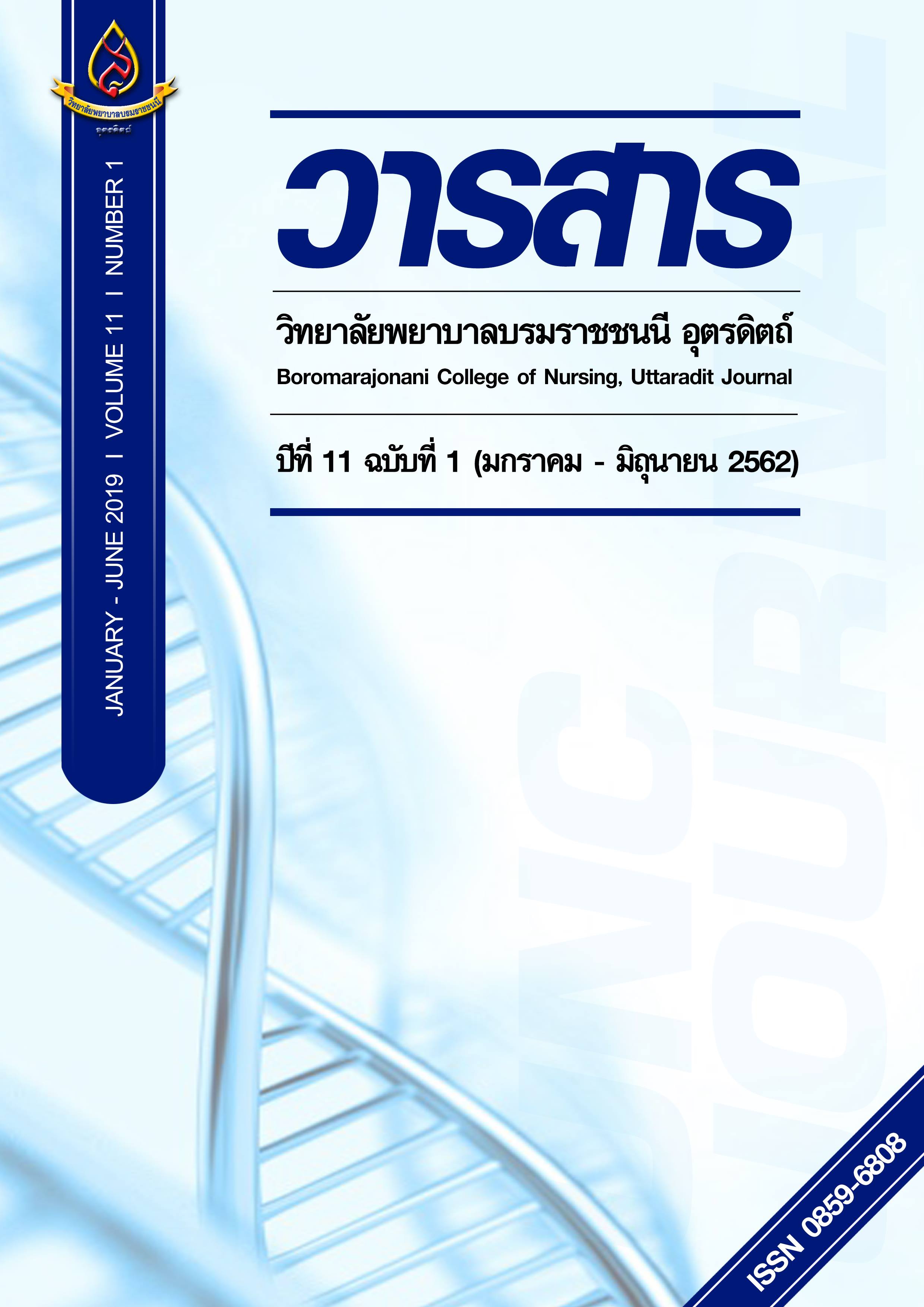ความรู้สึกไม่แน่นอนและการเผชิญความเครียดในสตรีตั้งครรภ์ช่วงรอผลวินิจฉัยการเจาะน้ำคร่ำ
Main Article Content
บทคัดย่อ
การวิจัยเชิงพรรณนาหาความสัมพันธ์ครั้งนี้มีวัตถุประสงค์เพื่อ ศึกษาความสัมพันธ์ระหว่างความรู้สึกไม่แน่นอนและการเผชิญความเครียดของสตรีตั้งครรภ์ในช่วงรอผลวินิจฉัยการเจาะน้ำคร่ำ กลุ่มตัวอย่างคือ สตรีตั้งครรภ์ที่ได้รับการเจาะน้ำคร่ำที่มารับบริการที่หน่วยวินิจฉัยก่อนคลอด โรงพยาบาลมหาราชนครเชียงใหม่ จำนวน 85 ราย เครื่องมือที่ใช้ในการวิจัย ได้แก่ แบบสอบถามความรู้สึกไม่แน่นอนในสถานการณ์ และแบบสอบถามการเผชิญความเครียดขณะตั้งครรภ์ ตรวจสอบความเชื่อมั่นได้ค่าสัมประสิทธิ์อัลฟาของครอนบาคเท่ากับ .82 และ .91 ตามลำดับ วิเคราะห์ข้อมูลโดยใช้สถิติพรรณนาและสถิติสัมประสิทธิ์สหสัมพันธ์แบบเพียร์สัน ผลการวิจัยพบว่า
1 สตรีตั้งครรภ์ช่วงรอผลวินิจฉัยการเจาะน้ำคร่ำมีค่าเฉลี่ยคะแนนความรู้สึกไม่แน่นอนในสถานการณ์ 78.26 (SD = 8.68) ซึ่งอยู่ในระดับปานกลาง และมีค่าเฉลี่ยคะแนนการเผชิญความเครียดขณะตั้งครรภ์โดยรวม 68.52 (SD = 7.58) ซึ่งอยู่ในระดับปานกลาง
2 สตรีตั้งครรภ์ช่วงรอผลวินิจฉัยการเจาะน้ำคร่ำ มีความรู้สึกไม่แน่นอนในสถานการณ์สัมพันธ์ทางบวกกับการเผชิญความเครียดขณะตั้งครรภ์โดยรวม อย่างมีนัยสำคัญทางสถิติ (r = .42, p < .01) 2.1 ความรู้สึกไม่แน่นอนในสถานการณ์มีความสัมพันธ์ทางบวกกับการเผชิญความเครียดแบบวางแผน-เตรียมพร้อมอย่างมีนัยสำคัญทางสถิติ (r = .25, p < .05) 2.2 ความรู้สึกไม่แน่นอนในสถานการณ์มีความสัมพันธ์ทางบวกกับการเผชิญความเครียดแบบหลีกเลี่ยงอย่างมีนัยสำคัญทางสถิติ (r = .35, p < .01) 2.3 ความรู้สึกไม่แน่นอนในสถานการณ์ไม่มีความสัมพันธ์กับการเผชิญความเครียดแบบประเมินทางบวก 2.4 ความรู้สึกไม่แน่นอนในสถานการณ์มีความสัมพันธ์ทางบวกกับการเผชิญความเครียดแบบสวดอธิษฐานอย่างมีนัยสำคัญทางสถิติ (r = .29, p < .01)
Article Details
บทความหรือข้อคิดเห็นใดใดที่ปรากฏในวารสารวิจัยการพยาบาลและวิทยาศาสตร์สุขภาพ เป็นวรรณกรรมของผู้เขียน ซึ่งบรรณาธิการหรือสมาคมศิษย์เก่า ไม่จำเป็นต้องเห็นด้วย และบทความที่ได้รับการตีพิมพ์เผยแพร่ถือเป็นลิขสิทธิ์ของวารสารวิจัยการพยาบาลและวิทยาศาสตร์สุขภาพ
เอกสารอ้างอิง
2 Dimri, N., & Baijal, A. (2016). Amniocentesis. Journal Fetal Medicine, 3, 131-135. doi:10.1007/s40556-016-0084-0
3 E-Kasingh, B. (1998). Uncertainty in illness and coping strategies in pregnant women with hypertensive disorder and diabetes mellitus. (master’s thesis). Graduate School, Mahidol University, Bangkok. (in Thai)
4 Folkman, S. (1997). Positive psychological states and coping with severe stress. Social Science & Medicine, 45(8), 1207-1221. doi:10.1016/s0277-9536(97)00040-3
5 Giurgescu, C., Penckofer, S., Maurer, M. C., & Bryant, F. B. (2006). Impact of uncertainty, social support, and prenatal coping on the psychological well-being of high-risk pregnant women. Nursing Research, 55(5), 356–365. doi:10.1097/00006199-200609000-00008
6 Hamilton, J. G., & Lobel, M. (2008). Types, patterns, and predictors of coping with stress during pregnancy: Examination of the revised prenatal coping inventory in a diverse sample. Journal of Psychosomatic Obstetrics and Gynecology, 29(2), 97-104. doi:10.1080/016748820701690624
7 Kowalcek, I. (2007). Stress and anxiety associated with prenatal diagnosis. Best Practice & Research Clinical Obstetrics and Gynecology, 21(2), 221-228. doi:10.1016/j.bpobgyn.2006.11.009
8 Lalor, J. G., Begley, C. M., & Galavan, E. (2008). A grounded theory study of information preference and coping styles following antenatal diagnosis of fetal abnormality. Journal of Advanced Nursing, 64(2), 185-194. doi:10.1111/j.1365-2648.2008.04778
9 Lazarus, R. S., & Folkman, S. (1984). Stress coping and appraisal. New York: Springer.
10 Mishel, M. H. (1981). The measurement of uncertainty in illness. Nursing Research, 30(5), 258-263.
11 Mishel, M. H. (1988). Uncertainty in illness. The Journal of Nursing Scholarship, 20(4), 225-232. doi:10.1111/j.1547-5069.1988.tb00082.
12 Mishel, M. H. (1990). Reconceptualization of the uncertainty in illness theory. The Journal of Nursing Scholarship, 22(4), 256-262. doi:10.1111/j.1547-5069.1990.tb00225
13 Nielsen, M. B., & Knardahl, S. (2014). Coping strategies: A prospective study of patterns, stability, and relationships with psychological distress. Scandinavian Journal of Psychology, 55,
142–150. doi:10.1111/sjop.12103
14 Parker, J. D. A., & Endler, N. S. (1992). Coping with coping assessment: A critical review. European Journal of Personality, 6, 321-344. doi:10.1002/per.2410060502
15 Penley, J. A., Tomaka, J., & Wiebe, J. S. (2002). The association of coping to physical and psychological health outcome: A meta-analytic review. Journal of Behavioral Medicine, 25, 551-603. Retrieved from https://link.springer.com/content/pdf/10.1023%2FA%3A1020641400589.pdf
16 Phipps, S., & Zinn, A. B. (1986a). Psychological response to amniocentesis I: Mood state and adaptation to pregnancy. American Journal of Medical Genetics, 25, 131-142. doi:10.1002/ajmg.1320250115
17 Phipps, S., & Zinn, A. B. (1986b). Psychological response to amniocentesis II: Effects of coping style. American Journal of Medical Genetics, 25, 143-148. doi:10.1002/ajmg.1320250116
18 Pochanart, A., Wonghongkul, T., & Sukonthasarn, A. (2013). Effect of supportive-educative nursing system on uncertainty in illness among newly diagnosed breast cancer patients. Nursing Journal, 40(3), 75-84. (in Thai)
19 Sjogren, B., & Uddenberg, N. (1989). Prenatal diagnosis and psychological distress: Amniocentesis or chorionic villus biopsy?. Prenatal Diagnosis, 9(7), 477-487. doi:10.1002/pd.1970090705
20 Sun, J. J., Lee, T. Y., & Liu, S. J. (1997) The meaning of undergoing amniocentesis for women of advanced maternal age. Nursing Study, 5, 171-180.
21 Sun, J. C., Hsia, P. H., & Sheu, S. J. (2008). Women of advanced maternal age undergoing amniocentesis: A period of uncertainty. Journal of Clinical Nursing, 17, 2829-2837. doi:10.1111/j.1365-2702.2007.02263
22 The annual report of maternal fetal medicine unit. (2017). Annual report 2017. Faculty of Medicine, Chiang Mai University: Department of Obstetrics and Gynecology. (in Thai)
23 Wilson, R. D., Gagnon, A., Audibert, F., Campagnolo, C., & Carroll, J. (2015). Prenatal diagnosis procedures and techniques to obtain a diagnostic fetal specimen or tissue: Maternal and fetal risks and benefits. Journal of Obstetrics and Gynecology Canada, 37(7), 656–668. doi:10.1016/S1701-2163(15)30205-X.
24 Yali, A. M., & Lobel, M. (1999). Coping and distress in pregnancy: An investigation of medically high-risk women. Journal of Psychosomatics and Gynecology, 20(1), 39-52. doi:10.3109/01674829909075575


